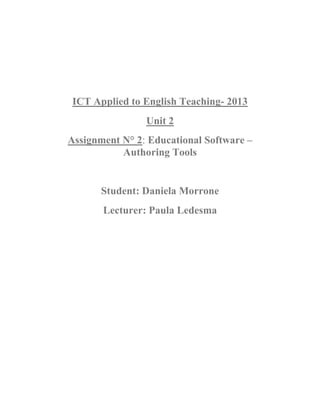
ICT Applied to English Teaching Lessons
- 1. ICT Applied to English Teaching- 2013 Unit 2 Assignment N° 2: Educational Software – Authoring Tools Student: Daniela Morrone Lecturer: Paula Ledesma
- 2. 2 2 Unit plan Textbook: Opportunities elementary Level of the students: elementary Age: 12-13 Unit objectives: Communicative focus: Talking about sport. Describing a sport and sport events. Grammar focus: can/ can‟t (expressing possibility), have to/ don‟t have to (expressing necessity), Must/ mustn‟t (expressing obligation) in the affirmative and negative. Vocabulary focus: sport vocabulary, sports, sport equipment, vocabulary related to football: goal, referee, umpire, team, stadium, champion, fans, players, draw, final, match, nil, penalty, captain, tournament. Recycled language: past simple, present simple These lessons will be carried out in the computer lab, previously reserved. The students will work in pairs or in groups of three in most of the activities. Lesson N° 1 – 40 minutes Before the activity: The teacher will introduce the topic of the unit “Sports” by brainstorming sport vocabulary, she will help the students by showing pictures illustrating sports to give them ideas. Then the students will do the crossword on sport vocabulary. They will have to read the clues, the description of the sport: Jcross sport vocabulary. Objectives: a) To became acquainted with the name of some sports presented in the unit. b) To practice the correct spelling of the sports. c) To use it as a starting point to talk about sport equipment and place categorize the sports according to the verb they collocate with: play, do, go.
- 3. 3 3 After the activity: The teacher will ask the students to name the sports that appeared in the crossword to place them in the right column: play, go, do. After this, the class will be asked to name some equipment used in each sport.
- 4. 4 4 Then the students will be asked to read the text from the book: „Underwater hockey.‟ On page 60 and do exercise 2, True or False. The teacher will then elicit the grammar focus of the lesson using the text. She will add some examples using must/ mustn‟t and will elicit the differences between each modal. Students will then complete exercises 4 and 5 on page 61.
- 5. 5 5 Lesson N° 2 – 40 minutes Jmatch Sport vocabulary. Sport rules. (part 1 and 2) Objectives:
- 6. 6 6 a) To guess the name of different sports by reading a description of their rules and equipment. b) To recognize the grammar point of presented in the previous lesson and notice the differences between „have to/ don‟t have to, can/ can‟t, must/ mustn‟t‟. c) To recognize vocabulary on sport equipment. d) To become aware of ways to express movement in English, by the use of prepositions.
- 7. 7 7 Then, the students will be asked to note the use of some prepositions in the description to express movement, and will do exercise 13 on page 61. Jquiz Field Hockey rules.(part 1, 2 and 3) Objectives: a) To present a model of a description of a sport. b) To practice the use of the different modal verbs in this context. c) To prepare the students for the communicative goal of the lesson: description of a sport.
- 8. 8 8
- 9. 9 9 After these two activities, the students will be asked in groups of three to choose a sport, not mentioned in the above activities, and write a description based on its rules and equipment used for the class to guess. Lesson N°3 – 40 minutes The students will be asked the following questions about sports and football, while eliciting new vocabulary that will be necessary for the next activity: 1) Which sports do you enjoy/ hate watching, playing? 2) Are you a fan of a sports team? Which one? 3) Is football important in your country? Name three famous players. 4) Do you like football? 5) Do you have a favourite team and a team you dislike? 6) How often do you play or watch football? 7) Do all your family like watching football? 8) How long does a normal football match last? 9) How many minutes are added after each half? Jcloze: Your most exciting sporting moments…(part 1 and 2) The students will be asked to read the article and complete with appropriate words. Objectives: a) To be able to guess which word is missing by reading its context.
- 10. 10 10 b) To practice vocabulary related to sport events. c) To present an authentic example of a description of a sport event.
- 11. 11 11 Jmix: Your most exciting sporting moments. Objectives: a) To be able to recognize the correct order of a sequence of actions or events. b) To show correct understanding of a text. After this the students will be asked to do the following task in groups of three: What is the most exciting sporting event you‟ve ever seen? Prepare your answers to these questions and discuss them with your group: 1) What sport was it? 2) When and where was it? 3) Who was taking part? 4) Were you there or did you see it on TV? 5) What happened? Final task: The students will be asked individually to write about a sport: Write a description of a sport you like. Follow the notes: Paragraph 1: When and how did you become interested in it?
- 12. 12 12 Paragraph 2: What equipment and clothes do you need? What are the basic rules – what do you have to do, mustn‟t do and what can you do? Paragraph 3: How often do you play? Where? Who with? Do you watch the sport on TV or go to matches? Why do you like it? Index
- 13. 13 13
- 14. 14 14